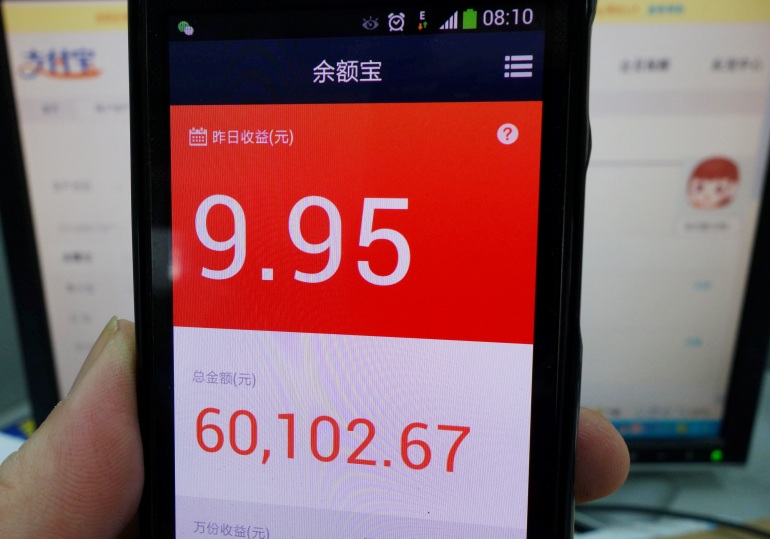Alibaba's Yuebao gives China's banks a rude awakening

A man uses Yuebao, the fund management platform under Alipay of Alibaba Group and Tian Hong Asset Management, on his smartphone in Dalian city, northeast Chinas Liaoning province, 17 February 2014. AAP
Chinese e-commerce giant Alibaba’s financial product Yuebao has more than 81 million customers and 18 million more than the combined number of retail investors on China’s Shanghai and Shenzhen stock exchanges.
It was founded back in June last year and within the short space of eight months, has managed to pull in half a trillion yuan or $90 billion of deposits from investors. Many of those investors have trading accounts with Alibaba -- the world’s largest on-line bazaar that sells more goods than Amazon and eBay combined (Alibaba and the Chinese banking thieves, 26 February).
The explosive growth of Yuebao has alarmed banks and Chinese regulators alike. Many depositors are fleeing banks and taking advantage of Alibaba’s 6 per cent annualised return. A commentator from the state broadcaster CCTV first branded Yuebao as a blood-sucking vampire and then the unofficial second central bank. Some have called for Yuebao to be banned.
So what is all the fuss about Yuebao? Let me explain it to you in a series of Questions and Answers.
What is Yuebao?
Yuebao is a financial product created by e-commerce giant Alibaba in June 2013. It offers higher interest returns for investors than traditional deposit accounts with banks do. For example, at the moment, Yuebao offers a 6.114 per cent annualised return, whilst the big four Chinese commercial banks only offers 3.25 per cent yield for a one year term deposit.
In addition, the investment threshold is one yuan and investors can redeem their money anytime. Now you can see why Yuebao is such a hit in China. It is managed by the Tianhong Fund, the country’s largest money market fund which primarily invests in short-term interbank loans and deposits.
Why it is a threat to banks?
Despite the explosive growth in Yuebao, which has attracted half a trillion yuan’s worth of deposits in eight months, the money it holds is less than 0.5 per cent of the total deposit held by Chinese banks -- about 74.2 trillion yuan. The total assets of Chinese banks is about 151 trillion yuan.
It is clear that Yuebao is fighting an asymmetric war with Chinese banking giants. But Chinese banks are secretly lobbying Chinese regulators to clamp down on Yuebao and subject it to same regulatory standard as deposit-taking institutions.
So why is Goliath so afraid of David?
Yuebao is essentially undermining Chinese banks’ biggest comparative advantage -- their low cost of capital. Deposit and lending rates are heavily regulated in China and banks are able to earn a fixed and lucrative return from the country’s vast pool of money. Though the central bank is liberalising interest rate policy, banks are still expected to enjoy this favourable policy for the foreseeable future.
Because of the lack of alternative investment options, Chinese depositors have been stuck with the banks. Now Yuebao and other products offered by Chinese internet companies offer long-suffering depositors alternatives and returns are always 50 per cent higher.
Products like Yuebao are forcing up the cost of capital for banks. China International Capital Corp, the country’s leading investment bank estimates that the banks’ net internet margins could be reduced to 0.15 per cent from 2013’s 2.68 per cent.
Apart from under-mining the banks’ revenue model, it is the speed that keeps Chinese bankers awake at night. Yuebao grew from 50 million yuan to 500 billion yuan in eight months. So it expanded 10,000 times in less than a year which works out to be something like 3 million yuan per minute.
China International Capital Corp also estimates that money market funds like Yuebao could manage funds comparable to 8 per cent of bank deposits in three years time. Now you get a picture why internet-based products like Yuebao are such a threat.
Is Yuebao’s future under threat?
Central bank governor Zhou Xiaochuan has told reporters that Yuebao will not be banned. However, you can expect life to get tougher for Alibaba in the future. Firstly, it is unlikely that Yuebao can continue its high return of six per cent into the future.
Yuebao was created back at a time when there was a liquidity crunch in the Chinese financial system and interbank lending rates spiked to an alarming level. Around about Yuebao’s birthday, the overnight repo rate surged to as much as 13.85 per cent.
Banks were desperate to attract deposits and Alibaba’s Yuebao was a gift from heaven at the time. It was able to negotiate good lending rates to banks. However, the liquidity problem has eased considerably in China and many analysts estimate returns on Yuebao could drop to 3 or 4 per cent.
At the same time, Chinese regulators expected to put products like Yuebao under more scrutiny as they grow ever bigger. Chinese bank regulators are expected to ask money market funds to keep more cash in reserve.
The development of internet financial products like Yuebao is a positive step for financial reform. It also shows what Chinese entrepreneurs are capable of once the government gets out of their way.
















